Can (And Will) A Bear Break Into Your RV?
Do you ever think of taking your RV and getting away from it all?
I sure do! It’s easy to picture my camper backed up next to a gently flowing mountain stream and vistas of snow-capped peaks just past the meadow filled with yellow and purple wildflowers.
If you’re anything like me, I know you can see it, too.
But wait! What’s that big black thing rumbling towards you?
And as clearly as you can imagine relaxing by that mountain stream, you can also see yourself running towards your RV, frantically wondering, “Can a bear break into my camper?
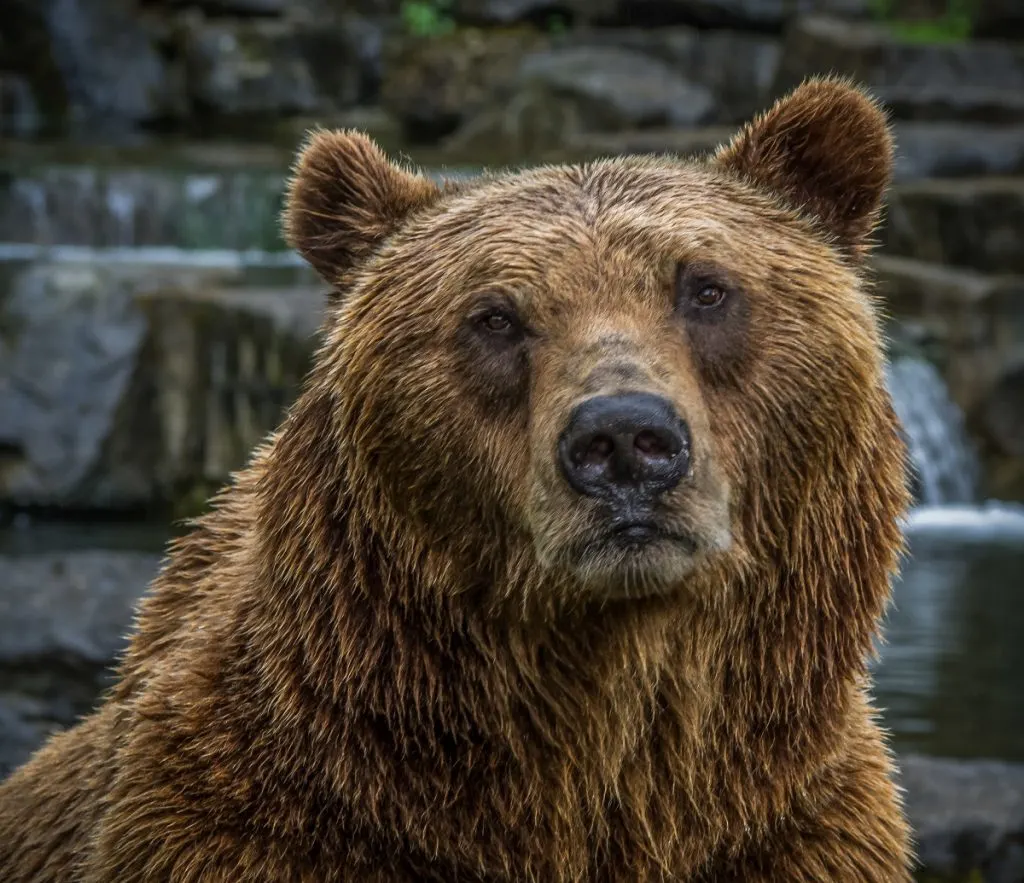
Bear vs RV: Who’s going to win?
Sounds quite frightening, but don’t let go of that idyllic image of your camper quite yet.
While bears can be a nuisance, most times it is only because humans have become a nuisance to them.
With bear habitat loss on the rise due to human encroachment on bear territory from housing developments, industry growth, agriculture and other factors, there’s sure to be an increase in conflict between bears and people.
This conflict oftentimes ends up with the bear, unfortunately, being killed to protect human life.

Can Bears Get Into RVs?
Yes, bears can get into RV’s…and coolers, and cars, and houses, and almost anything they really want to get into. With an average male black bear weighing around 200-300 pounds and a typical male grizzly around 600 pounds, they are not minuscule creatures.
They are big, strong, and quite often, hungry.
However, they generally don’t want to be around people, probably more so than you don’t want to come across a bear in your RV travels. You may hear about bear attacks or bears getting into houses quite often on the news, but this is not an overly common problem.
Bears are not going to hunt you down because they want revenge. They will, however, hunt you down if they feel threatened or you have food that they desperately need.
One of the easiest ways to prevent a bear from getting into your RV is to simply put things away.
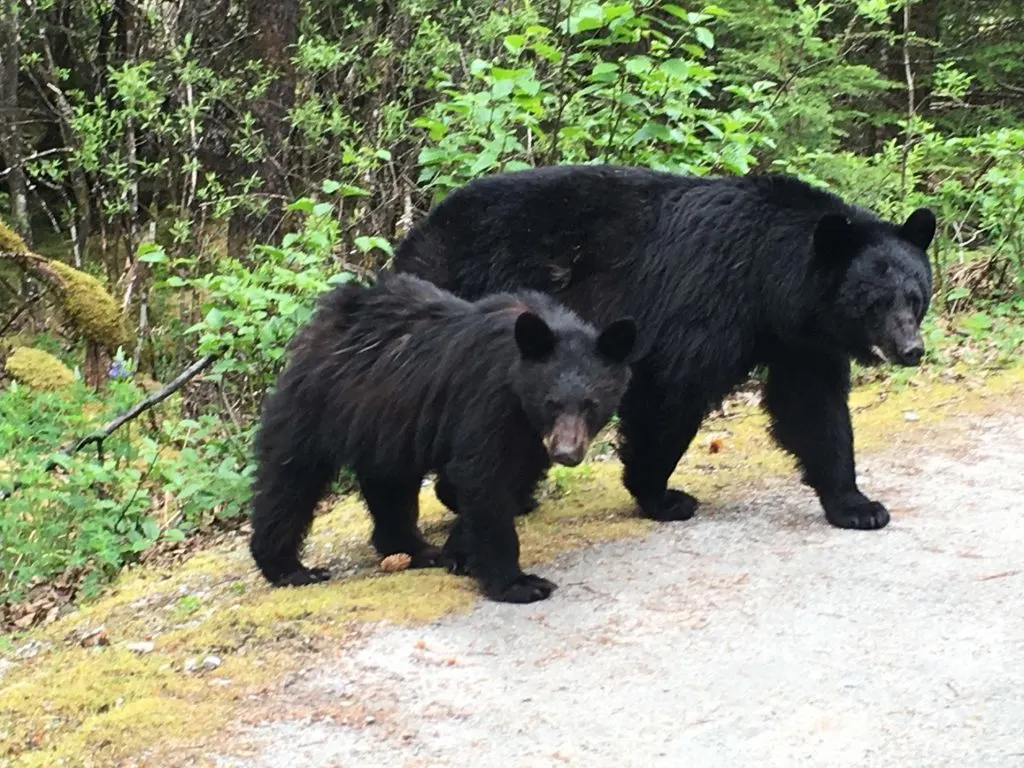
Don’t leave your trash outside at night, regardless of how badly it stinks up your camper. Clean your outdoor cookstove or grill and put it away before you head off to bed. Take the time to tidy up your camp spot. You wouldn’t leave trash lying around your house, why would you leave it lying around in nature?
Another thing to consider before heading out to your picture perfect spot is the type of camper you have.
When we think of RV’s we generally think of a solid structure on wheels. However, there are many campers out there that are soft-sided campers, such as pop-ups, or the increasingly popular roof-top tents or even motorcycle camper trailers.
These are quite convenient when it comes to owning and maintaining a camper, but they offer easier access to those curious and hungry bears.
And in many areas where bears have been known to frequent more often, these soft-sided campers aren’t even allowed.
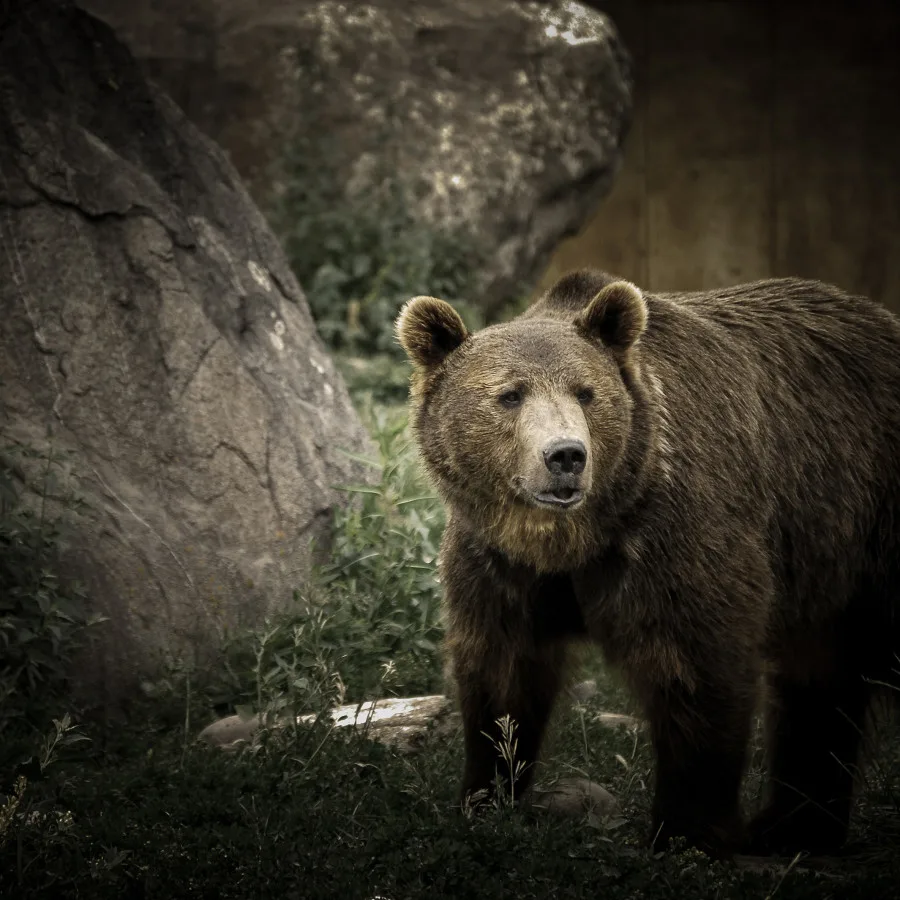
Check ahead before you head out, but some National Parks such as Yellowstone, Yosemite, and Glacier have specific campgrounds where you must have a hard-sided camper.
PRO TIP: These rules usually don’t apply to the free campsites near National Parks. We recommend you follow them still, though!
The National Parks have committed to keeping bears wild as much as they can. We’ve come a long way from the 20’s when it was ok and actually encouraged to feed the bears. We’ve learned a lot about keeping the wild in wildlife. Let’s not be the next star on the news because we think it’s cool to feed the pretty bears or pet the cute cubs.
What Attracts Bears to Campsites and What Precautions Can I Take?
Great, so how do we not gain that type of notoriety? First, you need to know what attracts bears to campsites, or anywhere for that matter.
- Food and food smells: Do I not cook? Of course, you can cook, but take the time to clean up after yourself. Clean the grill and put it away when done. Pick up the food pieces that you may have inadvertently dropped on the ground. Place your trash in bear proof trash cans if they are available. If not, store it inside your camper or car. Just don’t leave it outside.
Put uneaten or unused food away immediately, including the utensils used to cook it. If you are in a campground that has bear-proof storage bins, use them. If not, utilize hard-sided coolers and put them away in your camper or car.
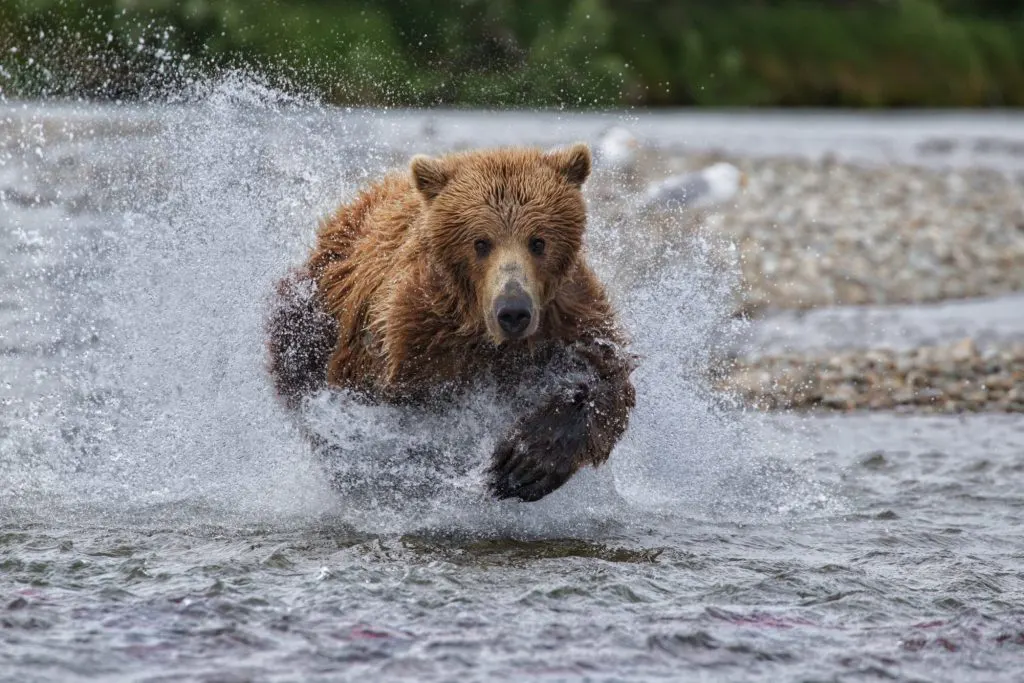
- Scented toiletries and anything scented: I get it, you want to smell good even when camping, but bears don’t smell toiletries, they smell something that could be food. So, toothpaste, deodorant, sunscreen, Gatorade, gum, mints, chapstick, anything scented – it all gets stored in a hard container and put away immediately. Treat it like food; the bears will.
- Trash and objects around the campsite: As mentioned earlier, you wouldn’t leave trash lying around your house, don’t leave it lying around outside. Take the time to scope out the perimeter of your campsite and pick up any trash you see, even the microtrash. And if you see trash while hiking or walking or biking, stop, pick it up, and dispose of it properly. The more we take responsibility for trash lying around – regardless of where it came from – the less conflicts we will have with wildlife and nature. As responsible campers, we take care of Mother Nature.
Utilizing Leave No Trace Principles
If you do your best to follow the Leave No Trace Principles, you will also be doing your best to keep nature natural. Briefly, the seven leave no trace principles are:
- Plan Ahead and Prepare
- Travel and Camp on Durable Surfaces
- Dispose of Waste Properly
- Leave What you Find (natural not trash)
- Minimize Campfire Impacts
- Respect Wildlife
- Be Considerate of Others
Yes, we have an impact on the land we are camping on. But we can reduce that impact, and as a result, reduce the unwanted confrontations.
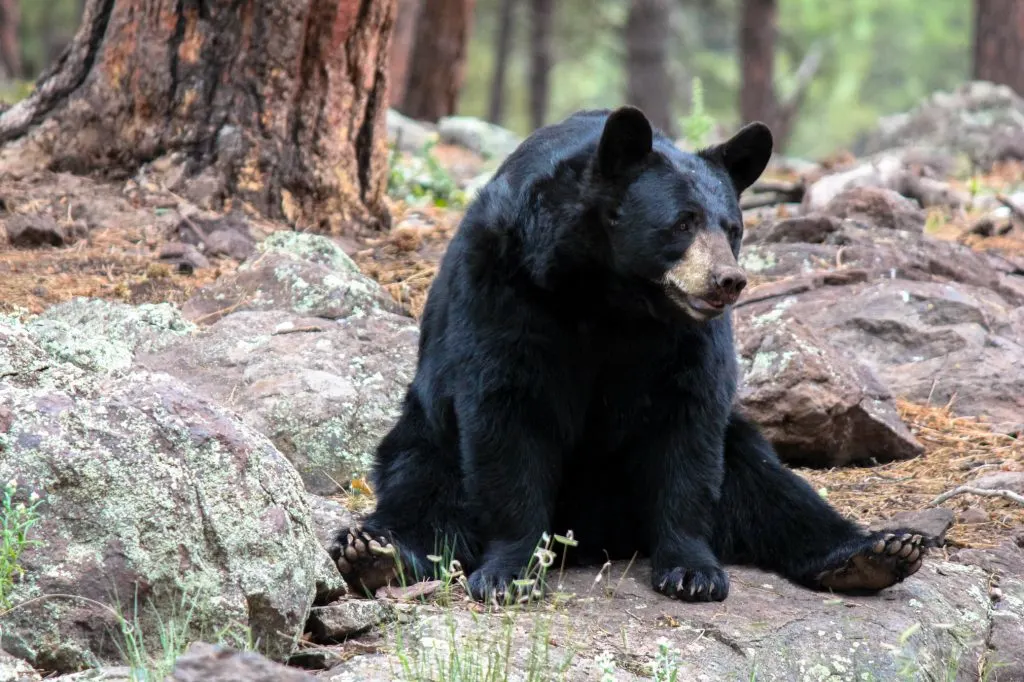
Bear Security for Your RV and Campsite
We also live in a technologically advanced world. So, while I know, as responsible campers and RVers, we will all do our best to keep the wild in wildlife, we can also utilize technology to help keep both humans and bears safe.
We want to stay safe from intruders, so why not install a set or two of motion lights or motion alarms on your RV or camper. Coming in many sizes, these offer an inexpensive way to keep you safe while scaring away the unwanted intruder.
Bear spray is also becoming quite popular with backcountry enthusiasts, full-time RVers, and weekend camping and hiking warriors.
Pricing averages around $40 and can be bought online and at many outdoor gear stores. As with any new gadget, learn when and how to use it. The more knowledgeable you are with bear behavior, the better the bear spray will do its job of getting space between you and the bear, so you can leave.

What to Do If You Encounter a Bear
If you’re driving along and spot a bear, enjoy the beauty of this magnificent creature from a distance. You’ve had the perfect bear-spotting experience.
However, there may come a time when you come across a bear in your campsite or while hiking. If this happens, the most basic thing to do is stay calm and back away slowly.
Do not run, even if the bear charges you.
Most times the bear will realize he has entered a human camping site and will want to get out of there faster than you do. There are times when this is not so, and depending on the situation, there are several ways to handle this. But again, do NOT run, and do NOT climb a tree. Check out the National Park Service guidelines for details on what to do in a bear encounter.
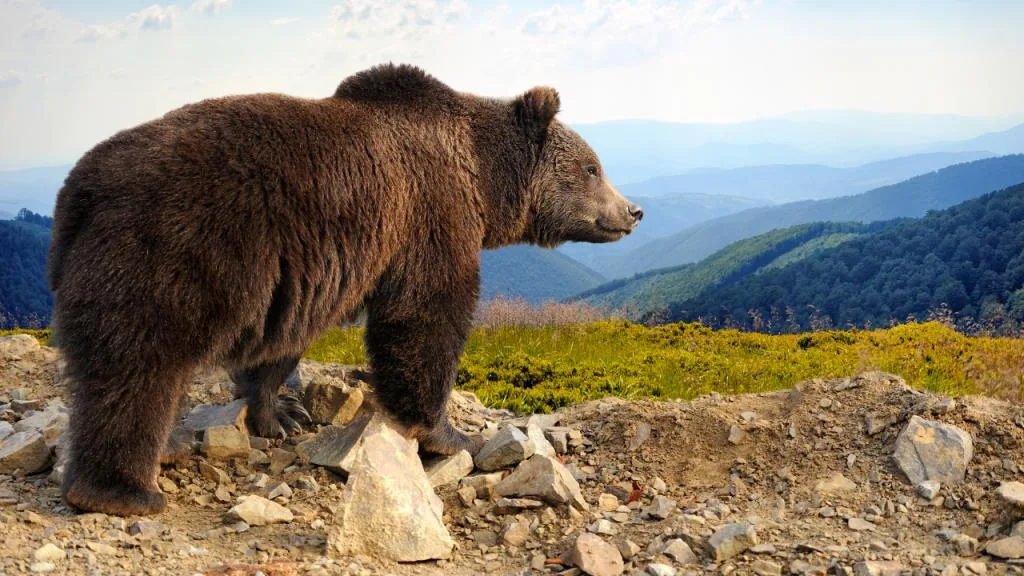
In Conclusion: Can a Bear Break Into Your Camper?
Yes, if a bear wants into your camper, he is getting in.
However, once a bear is conditioned to getting access to human food and knows how easy it is to obtain, ultimately, that bear will probably be killed to prevent any further conflict between humans and that bear.
Definitely not a winner.
Take precautions before heading to that picture-perfect spot, that one with the mountain stream, snow-capped vistas, and meadows full of wildflowers.
Knowing about bear behavior, what you can do to reduce your contact with bears, and utilizing security measures, your perfect vision of your perfect spot will not be marred by a big black thing rumbling towards you.
May your worries be about what book to read next to your stream, and not about the bears.
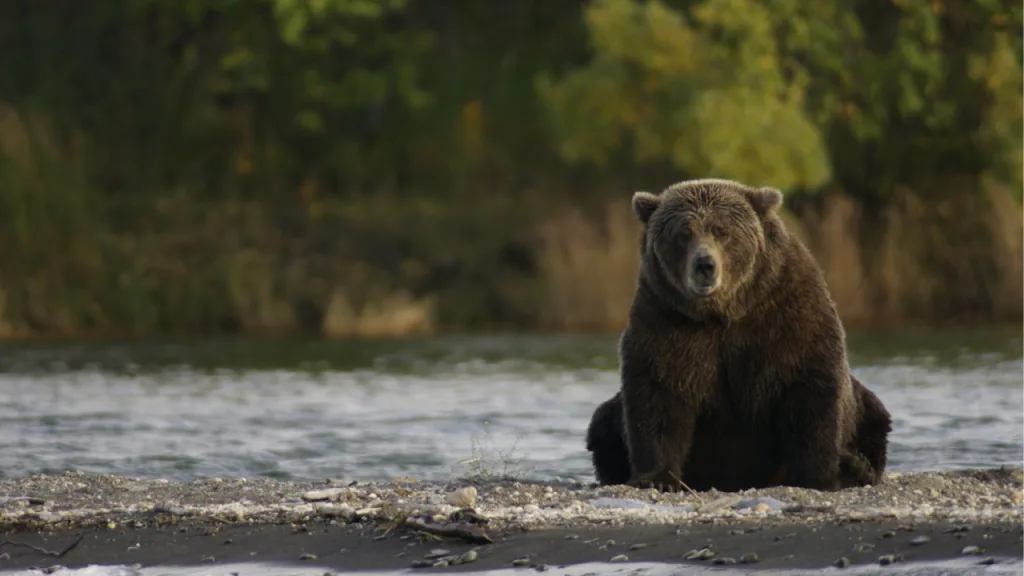
Discover the Best Free Camping Across the USA
To be honest with you, we hate paying for camping. There are so many free campsites in America (with complete privacy).
You should give it a try!
As a matter of fact, these free campsites are yours. Every time you pay federal taxes, you’re contributing to these lands.
Become a FREE CAMPING INSIDER and join the 100,000 campers that love to score the best site!
We’ll send you the 50 Best Free Campsites in the USA (one per state). Access the list by submitting your email below:
My LAST RESORT is a shotgun loaded with rifled slugs.
All good advice here. I used to be a ranger in Yosemite and we would warn people that bears understand what a cooler is. If they see one inside a car they can easily peel the door right off. So keep them where they cannot be seen or cover them up.
Now, bears don’t really bother me too much. Mountain Lions are a whole other matter. They only attack to kill and eat. They do not bluff charge or warn like bears do. If ever attacked by one you must fight for your life as it is trying to kill you. Since, unlike bears, they often leap on their prey from overhead rock ledges or a tree branch it is hard to walk and look for them. Like bears, hiking alone is not good, but since I’m alone in my travels, no choice. If the appropriate government agency is aware of one or more in an area you will often find a sign at a trailhead warning hikers. Sometimes because alone I will decide to go elsewhere. But if i do choose to hike i take my bear spray out of its holster and carry it ready to use. I also carry a gun and a sheath knife, not a folding one, but that’s up to each individual.
I travel with a cylindrical bear proof safe. I keep food & trash in separate plastic bags in this container, and leave it moored outside the camper overnight. Bruce Parker
Good information for us Ohioans!! Thank you !! We’ll be at the Yellowstone area soon, Sept 19-26, and I will remember your article and be extra careful – even of food scraps that may fall on the ground! We use a Camp Chef griddle, so that will be placed in the motorhome storage after every use- it never occurred to me to do that!! We are staying at Yellowstone’s Edge RV Park in Livingston MT, so at least we won’t be alone in the wilderness! Appreciate the info – have a great day 😊
Cliff Jacobsen is a wilderness camping and canoeing authority who has written extensively on the subject of dealing with bears in the wild. Check him out at http://www.cliffcanoe.com. BTW, he strongly favors bear spray over guns, and he breaks down bear attacks into three types: defensive, opportunistic and predatory. If you know which of these three situations you’re heading into, you can be better prepared to avoid bear interactions. Most of the recommendations in this article deal with opportunistic attacks — the bear wants the food you have. Keep it out of sight and smell and the bear won’t know it’s there!
I take exception to the use of bear spray.
From experience, I have never seen it work; not once. Even as close as 15 feet.
A better alternative is Raid Wasp Spray. Sprays accurately from 20′. And deters the bear.
Bear spray just seems to piss them off more. And please don’t spray the cubs.
Last year we were in Yellowstone and the Grand Tetons. We carried bear spray, hiked in a group of 4 or as a couple. Our one friend lead us in a “Hey Bear” song. It was fun. He sang a line. We repeated it. When we weren’t occasionally singing, we would talk loud or clap our hand now and then. You basically want to make noise so you don’t startle a bear. Some carry “bear bells” that you attach to your hiking shoes or backpack. We didn’t see a need for them. If they hear you you, most of them will want to leave the area. In the Grand Tetons, a trail we wanted to hike was closed for about a week because a bear had killed a moose by the trail. It wasn’t so much for the safety of the hikers, but for the safety of the bear, because there is always a newbie who doesn’t understand you don’t go near a bear’s kill because the bear is usually not too far away to protect it’s food. If a newbie gets too close an attack could occur and if it does, the bear will be caught and put down. Never good. The prior year we hiked to the bottom of the Grand Canyon and absolutely made sure deoderant, toothpaste and all food and dishes were in the bear proof container and the backpacks stored on the high hooks provided. Your advice is spot on. Just thought I’d share my hiking adventures where bear’s roam.